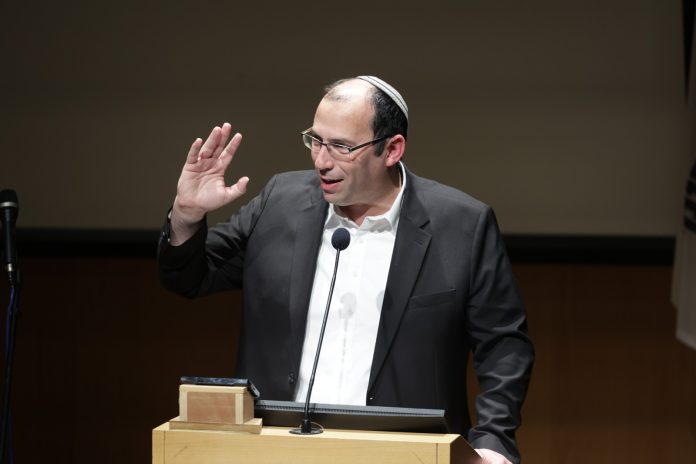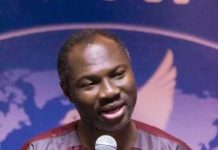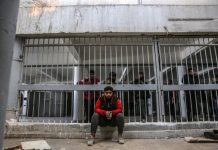
At the Beyadenu organization’s annual conference, held on Wednesday at Yad Yitzhak Ben Zvi in Jerusalem, Constitutional Committee Chair MK Simcha Rothman boldly called for change regarding Jewish access to the Temple Mount. Rothman urged the Chief Rabbinate to replace the current sign prohibiting Jewish ascent with one that explicitly allows Jews to ascend, emphasizing that the movement towards this goal must continue for the sake of Jewish heritage and the rebuilding of the Temple.

(Photo courtesy Beyadenu)
The conference was dedicated to the memory of Gershon Solomon z”l, a veteran Temple Mount activist, and the fallen soldiers who sacrificed their lives for the security of the Jewish people. Tom Nisani, CEO of Beyadenu, opened the event with a prayer for the release of hostages, healing for the wounded, and success for Israel’s forces. His words highlighted the growing momentum of Jewish activism surrounding the Temple Mount, with a focus on the importance of the site in Jewish history.
In August, five senior rabbis from Jerusalem, regarded as leading halachic (Jewish legal) authorities, released a video condemning the Tisha B’Av visit by government ministers Itamar Ben-Gvir and Yitzhak Wasserlauf, both from the right-wing Otzma Yehudit party, to the Temple Mount. The video with Arabic subtitles came at the request of Jerusalem Mayor Moshe Lion, following a plea from security officials.
Rabbi Avigdor Nebenzahl, the elder halachic authority in Israel and the Chief Rabbinic Authority of Jerusalem’s Old City, delivered a stern warning: “All the leading rabbis have signed—do not ascend the Temple Mount. It is strictly forbidden to enter the Temple Mount.”
Rabbi Shmuel Betzalel, a member of the Council of Torah Sages, and Rabbi David Cohen, a member of the Council of Torah Sages, endorsed the ruling.
Winds of Change for the Temple Mount
Nisani described the current period as a time of “winds of change” for the Temple Mount. He boldly declared that while the enemy sought to disrupt Jewish connection to the site through the “Al-Aqsa flood” scheme, it was instead met with a flood of Jewish ascenders. Nisani pointed out that a historic record for Jewish ascent to the Temple Mount was set in the Hebrew year 5784, and he expressed confidence that this is only the beginning. “God willing, we will continue to bring winds of change to the Mount,” he stated, reflecting the organization’s optimism and determination.
Rothman: A Call for Change
One of the central moments of the conference came when MK Simcha Rothman addressed the attendees. Rothman, a key figure in the push for Jewish rights at the Temple Mount, called for the Chief Rabbinate to change its policy and allow Jews to ascend the holy site. “I call on the Chief Rabbinate to replace the sign prohibiting ascent with a sign that permits Jews to ascend the Mount!” Rothman said, adding that he blesses everyone who ascends the Temple Mount in purity. He expressed his commitment to the ultimate goal of rebuilding the Temple, a dream that he believes will one day be fulfilled.
Rothman’s statement reflects the growing movement advocating for greater Jewish presence at the Temple Mount, a place of immense historical and spiritual significance for Jews worldwide.
Minister Karhi: The Temple Mount as a Symbol of Jewish Identity
Communications Minister MK Shlomo Karhi also spoke at the conference, emphasizing the Temple Mount’s centrality to Jewish identity and history. “The Temple Mount is a symbol of our roots in this land, a symbol of the bravery of the soldiers who returned the Temple Mount to us,” Karhi said, referencing the heroic efforts that led to Israel’s reunification of Jerusalem in 1967. He quoted Israel’s first Prime Minister David Ben Gurion, who famously stated, “Without Jerusalem, there is no Jewish state.”
In his address, Karhi expressed his hope that Israel’s forces would be victorious in the ongoing battle for the Jewish state, and that hostages would return home. “God willing, we will triumph and restore the glory and honor to the Jewish people!” he declared, emphasizing the existential importance of Jerusalem and the Temple Mount to the Jewish people.
MK Kalner: Legislative Action and a Dream of Change
MK Ariel Kalner also shared his thoughts on the importance of Beyadenu’s activism. He voiced his firm belief that the group’s dedication to its mission would lead to tangible outcomes. Kalner highlighted the legislative proposals he intends to promote, targeting rioters on the Temple Mount and those who attempt to destroy Jewish antiquities. He reiterated the Temple Mount’s pivotal role in connecting the Jewish people to their land and culture, and the need to combat efforts to undermine this connection.
“The struggle at the Temple Mount is Sisyphean and difficult, but only those who dream and continue to dream will ultimately succeed in changing reality,” Kalner said. “You are giving everything to the entire nation, and thanks to you, the dream will be fulfilled!” His words encouraged attendees to continue pushing forward in their efforts, no matter the obstacles.
Honoring the Fallen: Personal Testimonies
The testimonies of Yehoshua Sokol and Rabbi Yitzhak Sharvit, both fathers of fallen soldiers, heightened the emotional tone of the conference. Sokol spoke movingly about his son, Israel Soko HY”D, who lost his life in the line of duty, while Rabbi Sharvit shared his story of his son, Harel Sharvit HY”D. Both fathers’ words underscored the deep personal connection that many activists and leaders feel toward the Temple Mount and the broader struggle for Jewish sovereignty.

Rabbi Yehudah Glick (Photo courtesy Beyadenu)
Former MK Rabbi Yehudah Glick, known for his advocacy on behalf of Jewish rights to the Temple Mount, also addressed the crowd. Glick shared a harrowing account of his own near-assassination attempt due to his work for the Temple Mount, but he remained resolute in his belief that Jewish ascent to the Temple Mount is a right that cannot be denied. He led the crowd in a heartfelt rendition of the song “You Will Rise and Have Pity on Zion,” singing both in Hebrew and English.
A Vision for the Future
The Beyadenu conference was not only a gathering to honor the memory of those who have fallen but also a moment to rally those who are dedicated to the cause of Jewish ascent to the Temple Mount. With calls from prominent political figures, a commitment to legislative action, and the unyielding passion of activists, the movement for Jewish sovereignty over the Temple Mount is gaining momentum. As MK Rothman said, the path ahead is long, but with continued faith and effort, the dream of rebuilding the Temple may one day become a reality.
google.com, pub-6336011652228911, DIRECT, f08c47fec0942fa0









